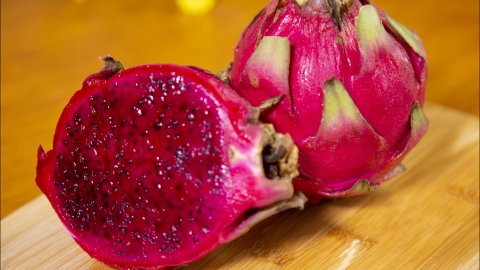What are the contraindications for eating red-fleshed dragon fruit?
Contraindications for consuming red-fleshed dragon fruit generally include avoiding excessive consumption during diarrhea, limiting intake for individuals with poor blood sugar control, contraindicating for those allergic to dragon fruit, caution for individuals with impaired kidney function, and avoiding simultaneous consumption with certain medications. If abnormalities occur, prompt medical attention is advised. Detailed explanations are as follows:

1. Not recommended during diarrhea: Red-fleshed dragon fruit is rich in dietary fiber and water, exerting a bowel-moistening and laxative effect. During diarrhea, intestinal function is weakened, and excessive consumption may intensify intestinal motility, worsening diarrhea symptoms and delaying intestinal recovery.
2. Limit intake for individuals with poor glycemic control: Red-fleshed dragon fruit contains a certain amount of sugar and has a relatively high glycemic index. Excessive consumption by individuals with unstable blood sugar control or diabetes may cause rapid increases in blood glucose levels, interfere with glycemic regulation, and negatively affect disease stability.
3. Contraindicated for individuals allergic to dragon fruit: Some individuals may experience allergic reactions to components of red-fleshed dragon fruit, presenting with symptoms such as skin itching, rash, or oral tingling after consumption. These individuals should strictly avoid consumption to prevent severe allergic reactions.
4. Caution for individuals with impaired kidney function: Red-fleshed dragon fruit contains a high amount of potassium. Individuals with impaired kidney function have reduced potassium excretion capacity, and excessive consumption may lead to potassium accumulation in the body, potentially causing hyperkalemia, increasing kidney burden, and disrupting electrolyte balance.
5. Should not be taken with certain medications: Components in red-fleshed dragon fruit may interfere with the effectiveness of anticoagulant medications. Individuals taking such medications should avoid large-scale consumption, as it may disrupt drug function and increase bleeding risk. A time interval should be maintained between consumption and medication intake.
Consumption of red-fleshed dragon fruit should be adjusted according to individual health conditions. If discomfort occurs after consumption, intake should be stopped and symptoms monitored; professional assistance should be sought if necessary. Special populations should consult a physician before consumption to ensure dietary safety.








